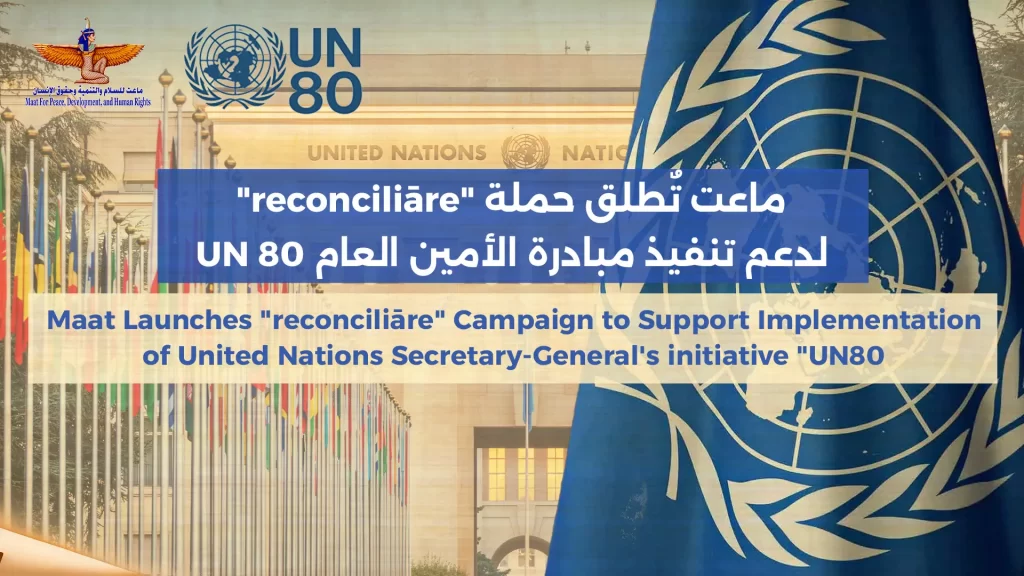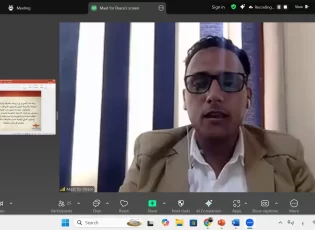On the Sidelines of the 43rd Session of the Universal Periodic Review
Maat Organizes an Event on the Universal Periodic Review of the United Arab Emirates
On Friday, May 12, 2023, Maat for Peace, Development and Human Rights convened an event on the Fourth Universal Periodic Review (UPR) of the United Arab Emirates (UAE) on the sidelines of the activities of the 43rd session of the UPR Mechanism. The event was attended by a group of experts in the field of human rights and women's empowerment; including: Mr. Ayman Okeil, President of Maat for Peace, Development and Human Rights; Ambassador Saeed Moqbel, President of the International Organization for the Least Developed Countries; Mr. Muhammad Ali Alaw, President of the Association Maonah for Human Rights and Migration; Engineer Omar Boudakhin, President of the Solutions for Sustainable Communities Foundation; Professor Lara El-Deeb, President of the Academy of Strategic Ethics; and Dr. Azza Medib, a media coordinator in the National Digital Debate Initiative for Youth. The event was moderated by Ali Muhammad, Deputy Director of the International Mechanisms Unit at Maat.
The speakers praised the progress made in the human rights record of the United Arab Emirates, while the speakers commended the importance of the Universal Periodic Review mechanism in improving the human rights situation in Member States, as it is a cooperative mechanism and was not established to hold states accountable but to motivate them to advance and advance human rights. The Human Rights Council in Geneva is governed by diplomatic relations and is governed by blocs that delay the process of reforming the Council and push towards double standards and double standards.
For his part, Ayman Okeil, the international human rights expert and President of Maat, said that the Human Rights Council does not pursue a policy of punishing violators, and that it is governed by diplomatic relations, indicating that the UAE national report reviewed the legislation, policies, and laws issued by the UAE in the period following the last periodic review. Moreover, Okeil noted the UAE's commitment to submit a mid-term report, which is voluntary and non-binding, indicating the state's keenness to cooperate with international mechanisms.
The Ambassador, Saeed Moqbel, President of the International Organization for the Least Developed Countries, demanded that the recommendations made during the UPR be consistent with the actual reality of the countries subject to review. He further stressed that the UAE's progress in the field of human rights is due to the duality of stability and development, recalling the speech of the Minister of Community Development, Shamma Al Mazrui, during the review session on May 8, 2023. Moqbel indicated that the progress made is due to an approach based on discrimination, rejection of violent extremism, prevention of hate speech, and combating terrorism, pointing out that human rights remain interdependent and indivisible. Besides, Moqbel noted that migrants enjoy their rights without discrimination on the basis of color, sex or religion, and drew attention to labor protection laws and the abolition of the sponsorship system.
In a related context, Muhammad Ali Alaw, President of the Association Maonah for Human Rights and Migration, stressed the need for civil society organizations to praise the positive steps taken by countries in the field of human rights and push toward overcoming the negative aspects of a cooperative framework with the concerned state. Alaw also noted that the UAE's positive progress is reflected in its leadership in most international indicators related to the field of human rights and the achievement of sustainable development goals, while referring to the establishment of the National Human Rights Commission, among other things, as evidence of the UAE's implementation of its commitments in the review mechanism.
In his word about the role of COP 28 to be held in the UAE, Omar Bakhkhan, President of the Foundation for Solutions for Sustainable Communities, stressed that climate change is a human rights issue, especially in developing countries and countries of the South, and referred to the UAE's commitment to reducing emissions by 2050, and its progress in implementing the carbon neutrality plan, proving the UAE’s capabilities in adapting to and mitigating the effects of climate change.
Lara El-Deeb, President of the Academy of Strategic Ethics, values some of the phrases contained in the national report submitted by the UAE to the UPR mechanism, including "integration of roles between men and women." El-Deeb also referred to the digital services that women in the UAE enjoy, including family counseling for women, especially pregnant women and mothers, and all women's reproductive rights. Besides, El-Deeb drew attention to the social assistance provided to women and children, noting that the World Bank report approved the issuance of legislation to reduce domestic violence, the application of criminal penalties against sexual harassment in the workplace, and the prohibition of discrimination in employment on the basis of gender, and the removal of restrictions on women to take up jobs in some sectors such as mining.
For her part, Dr. Azza Medib, a Media Coordinator in the National Digital Debate Initiative for Youth, said that the Labor Relations Law has been amended to remove all restrictions imposed on women’s labor in the evening shift, and referred to the amendments to the Personal Status Law, which granted women freedom of movement. Medib concluded her statement by saying that the intersection between women's empowerment and achieving the SDGs is so close.
Eventually, some of the speakers stressed that the presence of the Muslim Brotherhood in European countries and in Geneva had contributed to the promotion of false information. Thus, they demanded the necessity of creating a bloc of Arab civil society and the need to prevent Arab civil society from working in isolated islands, noting that the human rights are politicized by Western countries affecting mechanisms such as a comprehensive periodic review that did not exist to hold governments accountable but to help it fulfill its obligations in the field of human rights.
shortlink: https://maatpeace.org/en/?p=38361











